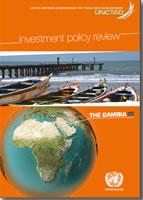
The Gambia has adopted an open regime for investment and a range of modern business regulation tools. However, supply-side constraints, vulnerability to exogenous shocks and remaining regulatory and institutional bottlenecks have negatively affected the development of the private sector and the country's performance in attracting FDI. In addition, the policy approach to private sector development has been characterized by frequent interventions in the form of ad hoc measures that often bear unintended consequences.
Increased investment and private sector development are recognized as essential to achieving the objectives of The Gambia's development strategies. In line with these goals, the Investment Policy Review (IPR), based on UNCTAD Investment Policy Framework for Sustainable Development (IPFSD), advocates a shift in the policy approach to private sector development and calls for the Government to adopt a facilitative role that focuses on creating an enabling business environment for all.
In addition to proposing concrete measures to foster economic development, job creation and knowledge transfers through effective public-private dialogue mechanisms, the IPR recommends to progressively replace company-specific support with a level playing field that is conducive to business creation. Furthermore, the UNCTAD report also calls for clearer investment entry restrictions and for measures to reduce the scope for discretionary interpretation of the laws, including in such key areas as labour, competition and corruption.
The IPR also recommends ways to strengthen investment promotion efforts and to better seize the benefits from FDI, notably in such sectors as agroprocessing, information and communication technology (ICT) and light manufacturing.


